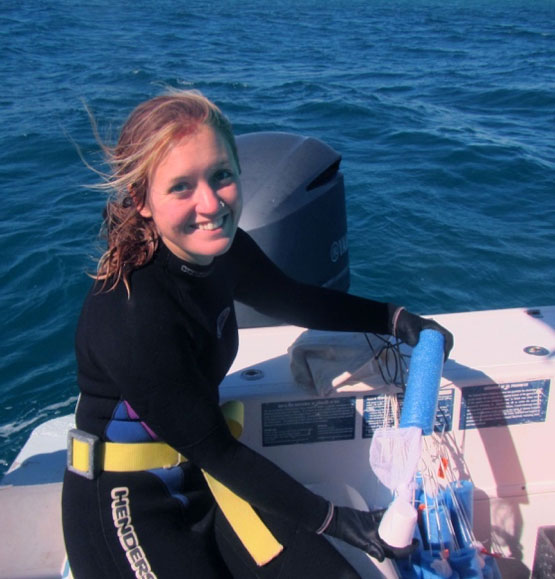
Jane Carrick
Track: Marine conservation - MES
Graduated: December 2016
What is your current job/project and main responsibilities? Please tell us as much as you like about what you are doing.
I am currently a Research Associate in Dr. Diego Lirman’s coral restoration and benthic ecology laboratory, focusing on natural and nature-based ecosystem restoration for the purpose of coastal protection. I work part time in the field performing coral restoration and part time in the lab studying how coral reefs and restoration can impact coastal resilience. As part of this, I collaborate with the SUSTAIN laboratory to conduct model reef wave attenuation simulations in the giant wave tank. I also assist with the restoration citizen science program Rescue a Reef, run by my colleague Dalton Hesley.
Why is what you are doing important?
As coral reefs decline at an alarming rate (75% of reefs are threatened globally and 1/3 of all coral species are at risk of extinction), restoration has become necessary to the recovery of local reef populations. Reefs are vital to our society, providing enormous benefits to fisheries stock, tourism and recreation industries, carbon sequestration, and coastal protection. On average, reefs dissipate 97% of shore-bound wave energy, making reefs the #1 most effective habitat in terms of coastal protection. If we can learn how to design restoration reefs and hybrid structures (like artificial reefs) to maximize the properties that provide this protection, we can begin to prioritize natural systems over gray infrastructure, thereby restoring both ecological function and providing coastal protection in the face of physical and biological climate-driven stressors.
What was your MPS track?
Marine conservation - MES
Please tell us about your time here at RSMAS. Provide one of your favorite memories.
I entered RSMAS in the spring of 2016. I had actually dreamt of attending graduate school here since my junior year of high school, when I went on a college tour of UM. Almost immediately, RSMAS became more than I had ever wished—this is a place where you are supported by your peers instead of competed out, where you have close relationships with all your professors who happen to be the top in their fields, and where the small-talk over beers always turns to the subject of sea slugs, scuba diving, or prevailing research of the week. Today, it feels more like home than a work place and all of my colleagues I also consider close friends.
My favorite RSMAS memory (so far!) was attending my first UM football game with the best group of friends I could ask for—I even ran into Pres. Frenk in the student section and got to take a selfie with him (see below). Go ‘Canes!
Tell us about your MPS internship. How did this internship help you get to where you are today?
As a long-time scuba diver, I was hoping to find an internship that had a strong fieldwork component. I lucked out when I started working with Dr. Lirman’s team as a part-time scientific diver helping with restoration activities. It wasn’t long before I knew I wanted to transition to his lab as a full-time intern and take ownership of a research project. Dr. Lirman had just been awarded a coastal resilience grant in collaboration with Dr. Andrew Baker, and I was thrilled to be selected as one of two interns for this grant’s activities. For my internship, I ran small-scale pilot studies to test reef-wave interactions in the lab and in the nearshore reefs of Broward Co. I learned how to plan and carry out my own targeted field studies and how to operate as a member of a cohesive and professional underwater team for this and other studies. I loved my internship so much that I returned post-graduation as a research assistant in the same lab, and have been able to scale up the coastal resilience project that my thesis work was based on.
List and describe 2 of your favorite classes at RSMAS. Why were they your favorite?
While I found every class I’ve taken here useful, I have to say that my two favorite classes were Biological Oceanography and Science Diving. Biological Oceanography was taught by the knowledgeable Larry Brand. I loved this class because of the breadth of information it spanned; we covered everything from biogeochemical ocean cycling to phytoplankton to marine megafauna. Scientific Diving was instructed by our Dive Safety Officer Rick Gomez and his assistant, Robbie Christian. Prior to taking this course, I’d worked as a scuba instructor, but my diving skills still vastly improved over the semester I took this course. Becoming an authorized scientific diver also opened up many opportunities for fieldwork that I was able to take advantage of!
What piece of advice would you give to current or incoming MPS students?
Show up to everything, especially during your first semester—go to the Wetlab on Fridays, attend graduate defenses and Sea Secrets seminars, participate in beach cleanups, go shark tagging, play pickup soccer with other RSMoids at Virginia Key Beach Park, volunteer at every opportunity. If you’re interested in marine conservation, get to know the local conservation groups like Rescue a Reef, Debris Free Oceans, Miami Waterkeeper, Recover Consortium, etc. etc. etc. You’ll find your friends and your passion before you know it.
Do not forget to include any photos/website links/etc. you would like us to share. Please provide us with any photo credits as well. Thanks again for your time!
Rescue a Reef: https://sharkresearch.rsmas.miami.edu/rescue-a-reef/
Research: https://news.miami.edu/stories/2018/06/coral-defense.html
Photo(s):




